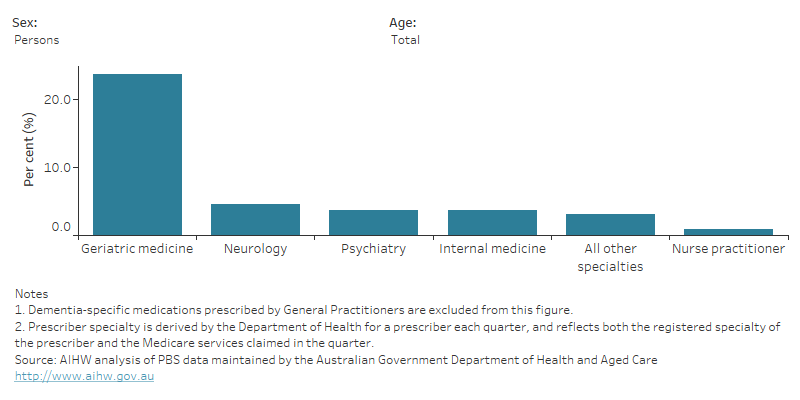Prescribers of dementia-specific medications
Who prescribed scripts for dementia-specific medications?
In 2021–22, 8 in 10 people (83%) who were dispensed script/s for dementia-specific medications were prescribed at least 1 script by a general practitioner (GP). In addition, 37% were prescribed by other medical specialists and less than 1% were prescribed by nurse practitioners (Table S8.12).
The majority (79%) of people who were dispensed dementia-specific medications were prescribed these by 1 type of prescriber (Table S8.13). However, as people can receive prescriptions for multiple dementia-specific medications throughout the year, they could be prescribed these by different types of prescribers (for example, prescribed once by a GP and once by a geriatrician). Just over 21% of people who were dispensed scripts for dementia-specific medications received these scripts from 2 different types of prescribers and just 0.1% received prescriptions from 3 different types of prescribers. Of the people who were prescribed dementia-specific medications by at least 2 types of prescribers, the majority (97%) were prescribed by a GP and another medical specialist (Table S8.14).
Types of medical specialists prescribing dementia-specific medications
Other than GPs, people were most commonly prescribed dementia-specific medications by specialists in geriatrics (24% of people who were dispensed a script for dementia-specific medications that year), followed by neurology (4.5%), psychiatry (3.7%) and internal medicine (3.6%) (Figure 8.9).
There was little difference in the prescribing patterns for men and women. However, patterns varied for people with younger onset dementia. As these people are younger and less likely to see a doctor with a specialisation in geriatric medicine, a greater proportion of dementia-specific medicines were prescribed by neurologists (15%) and psychiatrists (8.7%) than they were for people aged 65 and over (4.2% and 3.5%, respectively) (Table S8.15).
Figure 8.9: People who were dispensed dementia-specific medications in 2021–22: percentage by medical specialty of prescriber, age and sex
Figure 8.9 is a bar graph showing the percentage of people who were dispensed dementia-specific medications in 2021-22, by age and sex and by the prescribers’ medical specialty (excluding GPs). Almost one-quarter were prescribed dementia-specific medications by geriatricians. A much smaller percentage were prescribed by neurologists (4.5%) and psychiatrists (3.7%). There was little difference between men and women but younger people were more likely to be prescribed dementia-specific medicines by neurologists (15%) and psychiatrists (8.7%) than people aged 65 years or more.



